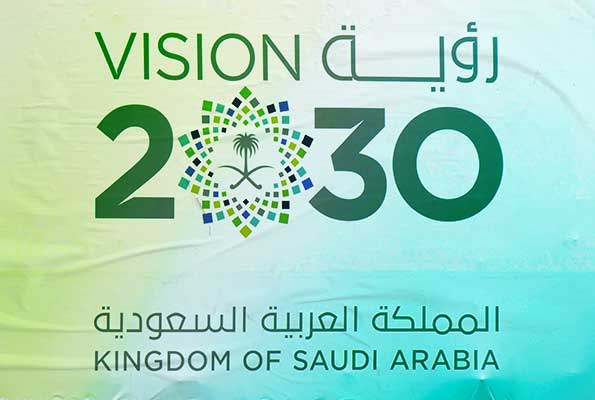An investor survey found that, amid trends like artificial intelligence (AI) and the shift in manufacturing activities away from China, Saudi Arabia’s ‘Vision 2030’ aspirations present the Kingdom with massive investment potential.
Saudi’s intentions to diversify its economy found a mention among over one-third of those polled by Egyptian investment bank EFG Hermes, while the use of AI was cited by one-quarter of respondents.
Only 15% of investors believed manufacturing was moving from China, and 14% believed that fundamental changes in the world’s energy markets represented the greatest investment opportunity.
Spreading The Word
At the ‘BMG Economic Forum 2023’, hosted at the London Stock Exchange’s headquarters, United Kingdom-based investors were urged to benefit from Saudi’s expanding economic opportunities.
A panel of Saudi Arabian businessmen stressed that the country is not only “open for business” but the regulatory changes have also made it a secure investment location.
The forum was conducted less than a month after Saudi’s minister of commerce, Majid Al-Qasabi, met with British ministers and business executives.
During a panel discussion, Amr Khashoggi, CEO of Amkest Group, mentioned the Saudi mining industry as a crucial area of promise for investors. He added, “We have more than USD 3 trillion worth of mining wealth under the ground.”
Amr Zedan, CEO of the Zedan Group, lauded the Kingdom’s leadership for its “laser-focus” approach to economic growth, which he claimed has transformed Saudi Arabia into “the land of opportunity.”
“Saudi Arabia presents the opportunity of what we used to hear in the US, where if you wanted to pursue a dream, reap the benefits, and be successful that’s very much attainable,” he continued.
“What you’re seeing now is an effort to exploit every advantage within the Kingdom of Saudi Arabia, be it location, be it a pilgrimage, be it the number of youth we have in the Kingdom of Saudi Arabia,” Zedan added.
He emphasized the need for “proper regulation” in the Kingdom’s economic sector, saying that “proper rules and governance” had contributed to the development of “a market that’s poised for growth in every way.”
“It’s open for anybody and everybody to have a successful operation in the Kingdom and go from Saudi to the world,” he added.
UK MP Lord Udny-Lister called Saudi Arabia “the most exciting country in the world.”
He expressed his admiration for “the enthusiasm and energy of individual Saudis.”
Saudi Business Setup
Foreign companies can register as a Subsidiary Company, Branch Office, Joint Stock Company, or Technical and Scientific Services Office (TSO) in the Kingdom. Each has its benefits, requirements, and business activities.
Foreign investors entering the Saudi market often form limited liability companies (LLCs) with a minimum capital investment of USD 133,100 (500,000 Riyals) and a maximum of 50 shareholders.
Foreign enterprises can register a wholly foreign-owned Saudi branch office with a required license. Branch offices must invest USD 133,100 (500,000 Riyals) to conduct business.
A Saudi Joint Stock corporation has the same minimum capital investment but at least two shareholders and three directors, who can be non-Saudi residents. The Commercial Registration Certificate is issued after MISA approves the formation of such businesses.
“Historically, setting up and operating in Saudi has been difficult and confusing. This mindset is changing, and with the right professional support and guidance at each critical step, obtaining a Commercial Registration and ensuring the correct governance and compliance of ongoing business operations is achievable,” Sovereign PPG’s Managing Director Paul Arnold said.
Businesses should have lucrative, audited financials and a track record from their home nation. Most investors want MISA-approved 100% foreign ownership. A General Manager with Saudi residency (Iqama) should handle local corporate matters, including opening a bank account.
Investors also expect the Companies Law to improve corporate structures and statutory procedures.
Arnold stressed that the business must be registered and present in Saudi to do business in the Kingdom. Saudi Arabia issued a record 600% more investment licenses in the second quarter of this year.
“I believe there is no other market opportunity like Saudi Arabia in the world,” he added.
Entrepreneurship is growing, and venture capital opportunities are plentiful.
“Investors we speak to are keenly aware that Saudi is the next place to be as they look to mitigate risk, expedite setup, and accelerate their success in the Kingdom,” Arnold said.
The ‘Saudi Regional Headquarters Programme’, launched in 2021, requires multinational corporations operating in the Kingdom to establish their headquarters in Riyadh.
In early-2022, the Kingdom unveiled a strategy to construct up to 20 Special Economic Zones (SEZs).
“There is also lots of conversation amongst the business community about reducing a perceived gate to entry for trading firms in the Kingdom, where the present share capital minimum stands at about SAR 30 million [approx. USD 7.9 million]. This should be reduced soon to boost cross-border and domestic trade,” the official added.



